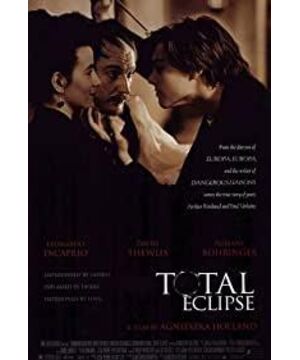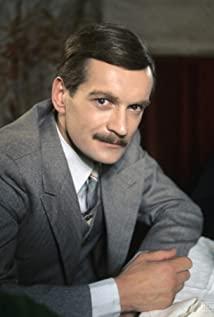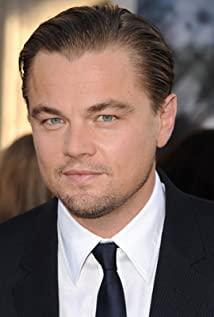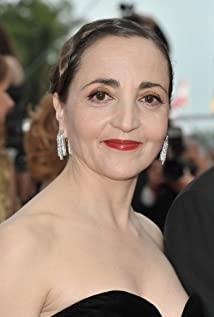While Verlaine was a poet, Rimbaud was a genius—a revolutionary. - The beginning of the film says so.
The genius came to London with expectations and pursuits, and came to Wei Lun's home. Rimbaud, a child who grew up in a simple country, absorbs the aura of nature, and in his eyes there are no rules and regulations of worldly morality. He is direct, reckless, pure and natural, expressing his emotions like a primitive man. In the eyes of the poet Wei Lun, who has been tortured by life and corrupted by money for a long time, Rimbaud is the source of his inspiration. He loves his debauchery, loves his free and easy nature, and finally falls in love with him desperately.
In the scene in the tavern, where they were drinking absinthe, Wei Lun hypocritically excused himself by beating his wife. He is a mortal after all, with too many desires on his body, it is impossible for him to abandon everything and pursue his own beliefs like Rimbaud.
"I love her body, but I don't love her soul. Loving the soul is not as important as loving the body. The soul is immortal and has enough time to love, while the body rots. Loving the body will make me faithful."
Rimbaud's face was full of disgust He stared at the self-deceiting down-and-out poet, filthy, ugly and bald, not wanting to guess that he was only inseparable from his wife for the sake of money. But Wei Lun rubbed his ear and whispered to him ambiguous: "There is one thing you must know, that is, I have never loved anyone as much as I have loved you, and I will always love you." Rimbaud looked at him, his eyes wandering, he stared deeply at Wei Lun, as if to see his heart, "You said you love me? Put your hand on the table with the palm facing up." Wei Lun did as he did. . Rimbaud lightly slashed the skin on Wei Lun's hand with a knife, and then stabbed it fiercely.
Rimbaud loves Wei Lun, forbearance and deep love. Painful because of love. But he also knew that Wei Lun could not be with him forever. After all, they had the difference between genius and mortal. When Rimbaud looked at Wei Lun who was gradually leaving with a sad face on the dock, the young man's heart-wrenching face was in the camera. His love also died in despair while crying
Rimbaud is alone. Just like the fate of so much genius. Ideas that are too advanced are destined not to be understood by the majority of people, and they are destined to die alone. He finally left Wei Lun in a tragic way, and Wei Lun paid the price for it. When they finally met in the Black Forest, Rimbaud refused to follow Wei Lun. Wei Lun asked reluctantly, "Why?" Rimbaud looked at Wei Lun indifferently, "Because you missed the shot."
Their love struggled fiercely with the collision with the world. In my opinion, between the two of them, the person who loves the most is Rimbaud. Even if he only said to Wei Lun, you know that I like you; even if Wei Lun once said to him that I love you more than once, I will not be able to live without you. But Rimbaud's love is real, pure, and unplanned. So when Wei Lun shot him, he almost couldn't believe it and wanted to die. "Why didn't you hit." His heart finally died, in Wei Lun's selfish love.
Years later, Wei Lun listened to Rimbaud's sister tell about his life of displacement. He is tenacious and forbearing, even if he is tortured by illness, even if he is physically disabled, he never stops his steps. Life seems tragic, but it is bright.
Wei Lun was in a trance, as if he saw the beautiful and suffocated teenager sitting in front of him. Thin lips pursed slightly, his eyes rolled, and he looked at him with a charming and evil spirit.
"Do you love me?"
"Yes, I love you."
"Put your hand on the table, palm up."
There is no feeling of the knife slamming into the palm, everything is an illusion.
Emile said that we only realize how much we love each other when we cry together. It is also a kind of happiness to cry and love each other even though it is painful.
View more about Total Eclipse reviews











